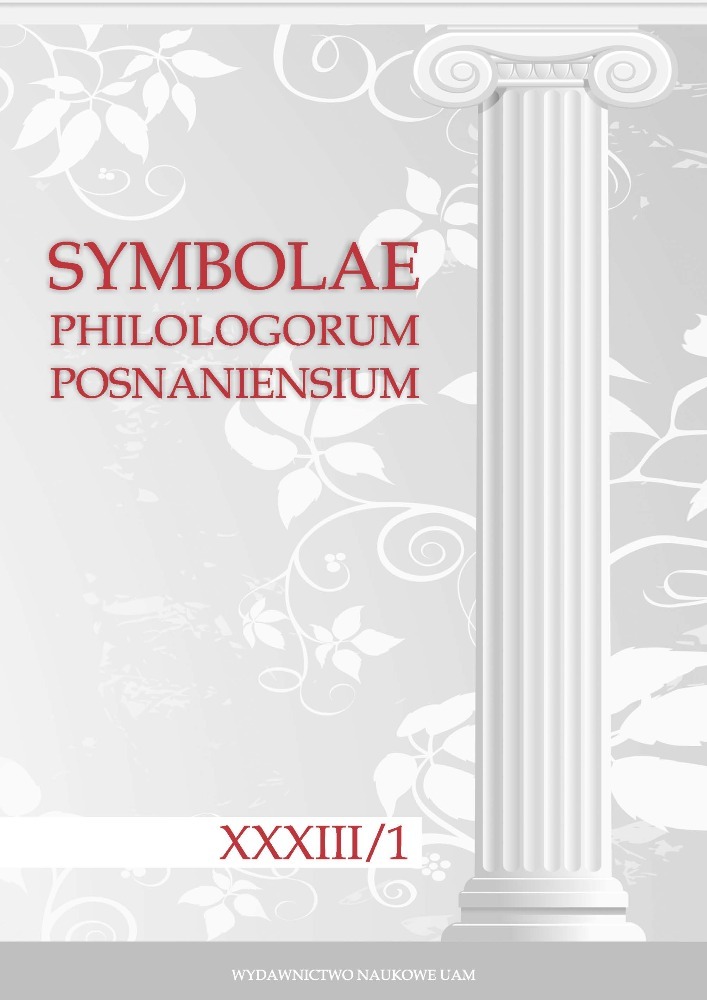Abstrakt
Doubts concerning the authorship of the work contemporarily entitled Commentariolum Petitionis were raised even in the late nineteenth century. Both those researchers who regarded Quintus (Cicero’s brother) as the author and those who questioned his authorship found their supporters. In this context, Michael Alexander stands out, arguing in his publications that the intention behind the pamphlet was to provide a distanced or even warped image of late-Republican electioneering. The debate continues, and the importance of the present-day interpretation must be emphasised. Even if perhaps satisfactory for those who attribute the authorship to Marcus Cicero, recent computerassisted stylometric studies in fact fail to provide a conclusive answer as to who the author of the Commentariolum Petitionis actually was. Stylometric evidence may even be quoted to prove that it might have been written by someone skilful enough to imitate the eminent orator’s style.
Bibliografia
Kwintus Cyceron, Broszura przedwyborcza Kwintusa Cycerona, przeł. J. Wikarjak, „Meander” 1965, 330–346.
Kasjusz Dion, Historia rzymska, księgi 41–50, przekł., wstęp, komentarze I. Ptaszek, Kraków 2008.
Marek Fabiusz Kwintylian, Kształcenie mówcy (księgi I, II i X), przekł. i wstęp M. Brożek, Warszawa 2002.
Marek Fabiusz Kwintylian, Kształcenie mówcy (księgi VIII6–XII), przekł., wstęp, i przypisy S. Śnieżewski, Kraków 2012.
Alexander 2009: M.C. Alexander, The „Commentariolum Petitionis” as an Attack on Election Campaigns, „Atheneum” 97 (2009), 31–57; 369–395. DOI: https://doi.org/10.1159/000252742
Alexander 2018: M.C. Alexander, Roman Amoralism Reconsidered. The Political Culture of the Roman Republic and Historians in an Era of Disillusionment, self Published, 9780692066430 (online).
Alexander 2021: M.C. Alexander, The Ironic Interpretation of the Commentarolum Petitionis. A response to Prost, Tatum, and Silet, „Atheneum” 109 (2021), 64–113.
Appel 2019: H. Appel, Ite in suffragium. O wyborach w republikańskim Rzymie, Toruń 2019.
Balsdon 1963: J.P.V.D. Balsdon, The commentariolum petitionis, „The Classical Quarterly” 13 (1963), 242–250. DOI: https://doi.org/10.1017/S0009838800001853
Dugan 2005: J. Dugan, Making a New Man: Ciceronian Self-Fashioning in the Retorical Works, Oxford 2005. DOI: https://doi.org/10.1093/acprof:oso/9780199267804.001.0001
Eussner 1872: A. Eussner, Commentariolum Petitionis examinatum atque emendatum, Würzburg 1872.
Freeman 2012: Ph. Freeman, How to Win an Election: An Ancient Guide to Modern Politicians, Princeton 2012.
Gabba 1957: E. Gabba, Nota sulla polemica anticiceroniana di Asinio Pollione, „Rivista Storica Italiana” 69 (1957), 317–339.
Henderson 1950: M.I. Henderson, De commentariolo petitionis, „The Journal of Roman Studies” 40 (1950), z. 1–2, 8–21. DOI: https://doi.org/10.2307/298498
Hendrickson 1892: G.L. Hendrickson, On the Authenticity of the Commentariolum Petitionis of Quintus Cicero, „The American Journal of Philology” 13 (1892), 200–12. DOI: https://doi.org/10.2307/288307
Jacob 2002: N. Jacob, Antike Traditionen im modernen Wahlkampf: Quintus T. Ciceros Denkschrift über die Konsulatsbewerbung, w: Moderner Wahlkampf. Blick hinter die Kulissen, Opladen 2002, 9–23. DOI: https://doi.org/10.1007/978-3-322-95052-9_1
Kumaniecki 1977: K. Kumaniecki, Literatura rzymska. Okres cyceroński, Warszawa 1977.
Kwapisz 2003: J. Kwapisz, Jak wygrać wybory w Rzymie, „Mówią Wieki” 2003, 19–22.
Langer 1994: U. Langer, Perfect Friendship: Studies in Literature and Moral Philosophy from Boccaccio to Corneille, Geneva 1994.
La Bua 2019: G. La Bua, Cicero and Roman Education: The Reception of the Speeches and Ancient Scholarship, Cambridge 2019. DOI: https://doi.org/10.1017/9781107705999
Morstein-Marx 1998: R. Morstein-Marx, Publicity, Popularity and Patronage in the Commenatariolum petitionis, „The Classical Antiquity” 17 (1998), 191–217. DOI: https://doi.org/10.2307/25011085
Nardo 1970: D. Nardo, Il Commentariolum Petitionis:la propaganda elettorale nella ars di Quinto Cicerone, Padua 1970.
Nieć 2005: M. Nieć, Cyceroński ideał kampanii wyborczej, w: Państwo i Społeczeństwo, Media i Polityka, red. S. Kilian, Kraków 2005, 51–58.
Nisbet 1961: R.G.M. Nisbet, The Commentariolum Petitionis: Some Arguments against Autheticity, „The Journal of Roman Studies” 51 (1961), 84–87. DOI: https://doi.org/10.2307/298839
Peirano 2012: I. Peirano, The Rhetoric of the Roman Fake: Latin Pseudepigrapha in Context, Cambridge 2012. DOI: https://doi.org/10.1017/CBO9780511732331
Shackleton Bailey 1980: D.R. Shackleton Bailey, Cicero: Epistulae ad Quintum fratrem et M. Brutum, Cambridge 1980.
Shackleton Bailey 2002: D.R. Shackleton Bailey, Cicero, Letters to Quintus and Brutus; Letter Fragments Letter to Octavian; Invectives; Handbook of Electioneering, London 2002.
Shackleton Bailey et al. 2002: D.R. Shackleton Bailey et al., Commentariolum Petitionis, London 2002.
Sillet 2016: A. Sillet, Quintus Cicero’s Commentariolum: A Philosophical Approach to Roman Elections, w: Splendide mendax: Rethinking Fakes and Forgeries in Classical, Late Antique & Early Christian Literature, eds. E.P. Cueva, J. Martinez, Groningen 2016, 177–191. DOI: https://doi.org/10.2307/j.ctt20d86x1.13
Salzman 2016: M.R. Salzman, Latin Letter Collections before Late Antiquity, w: Late Antique Letter Collections: A Critical Introduction and Reference Guide, eds. C. Sogno et al., California 2016, 13–37. DOI: https://doi.org/10.1515/9780520966192-005
Sommers, Tweedie 2003: H. Sommers, F. Tweedie, Authorship Attribution and Pastiche, „Computers and the Humanities” 37 (2003), 407–429. DOI: https://doi.org/10.1023/A:1025786724466
Tatum 2007: W.J. Tatum, Alterum est tamen boni viri, alterum boni petitoris: The Good Man Canvasses, „Phoenix” 61 (2007), 119–131.
Till 1962: R. Till, Ciceros Bewerbung ums Konsulat (Ein Beitrag zum Commentariolum petitionis), „Historia” 11 (1962), 315–338.
Vainio, Välimäki, Vesanto, Hella, Ginter, Kaartinen, Immonen 2019: R. Vainio, R. Välimäki, A. Vesanto, A. Hella, F. Ginter, M. Kaartinen, T. Immonen, Reconsidering Authorship in the Ciceronian Corpus through Computational Authorship Attribution, „Ciceroniana on line” III (2019), z. 1, 15–48.
Wikarjak 1966: J. Wikarjak, Brochure Electorale de Quintus Ciceron, „Archivum Filologiczne” 14 (1966).
Licencja
Prawa autorskie (c) 2023 Hanna Appel

Utwór dostępny jest na licencji Creative Commons Uznanie autorstwa 4.0 Międzynarodowe.

